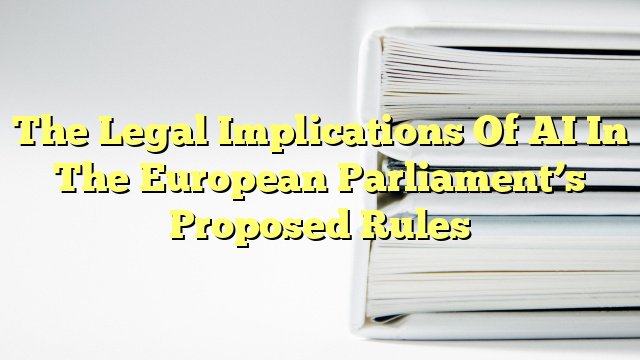The European Union (EU) is increasingly turning its attention to the legal implications of Artificial Intelligence (AI). The European Parliament is currently considering a proposal for a regulation on a European approach for artificial intelligence (AI). This proposed regulation sets out guidelines for developing trustworthy AI, as well as rules on the use of AI for certain activities.
What is the European legislation on artificial intelligence?
Currently, the EU has no specific legislation on the use of artificial intelligence. However, the European Commission has adopted the European Artificial Intelligence Strategy in 2020, which outlines a common European approach to the development and use of AI. The strategy includes a set of principles for the responsible use of AI, as well as a list of areas that should be regulated.
What is the proposal for a regulation on a European approach for artificial intelligence?
The proposed regulation on a European approach for artificial intelligence is intended to provide a legal framework for the development and deployment of AI in the EU. The proposed regulation sets out a number of key principles for the responsible development and use of AI. These principles include transparency, fairness, safety, security, and privacy.
The proposed regulation also establishes rules on the use of AI for certain activities. These activities include the use of AI for decision-making, automated decision-making, and profiling. The proposed regulation requires businesses to provide a certain level of transparency when using AI for these activities.
Do the EU’s guidelines for trustworthy AI have the force of law?
The EU’s guidelines for trustworthy AI do not have the force of law. However, the proposed regulation includes a number of provisions that are intended to ensure that AI is developed and used responsibly. For example, the proposed regulation requires businesses to provide a certain level of transparency when using AI for certain activities and to provide meaningful information about the workings of AI-based systems.
What are the prohibited artificial intelligence practices in the proposed EU Artificial Intelligence Act?
The proposed EU Artificial Intelligence Act includes a number of prohibitions on the use of AI. These prohibitions include the use of AI for activities that are prohibited by EU law, such as discrimination and manipulation. The proposed regulation also prohibits the use of AI for activities that are considered to be a violation of fundamental rights, such as activities that infringe on the right to privacy or the right to non-discrimination.
The proposed regulation also prohibits the use of AI for activities that are considered to be a violation of labour law or consumer law, such as activities that involve the exploitation of workers or that are misleading or deceptive to consumers. The proposed regulation also prohibits the use of AI for activities that are considered to be a threat to public safety or security.
The proposed regulation also requires businesses to assess the risks associated with the use of AI and to ensure that their AI systems are deployed in a safe, secure, and lawful manner. The proposed regulation also requires businesses to provide meaningful information about the workings of AI-based systems and to take appropriate measures to protect the rights of individuals whose data is being used by the AI system.
The proposed regulation also requires businesses to provide meaningful information about the decisions that are made by AI-based systems and to take appropriate steps to ensure the accuracy and fairness of those decisions. The proposed regulation also requires businesses to provide meaningful information about the ways in which AI-based systems are monitored and audited.
The proposed regulation also sets out a number of requirements for the development and deployment of AI systems, including requirements relating to the design, testing, and use of AI systems. The proposed regulation also sets out a number of measures that businesses must take to ensure that their AI systems are reliable, secure, and compliant with EU law.
The proposed regulation also requires businesses to provide appropriate training and support to users of AI systems and to ensure that the use of AI is not used to circumvent legal protections. The proposed regulation also contains a number of measures that businesses must take to ensure that AI is used responsibly and in accordance with applicable law.

